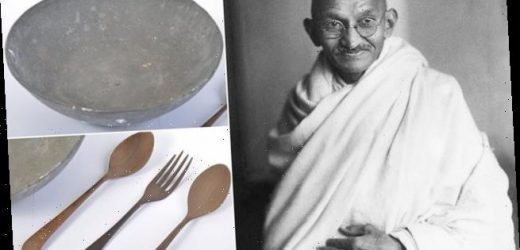Mahatma Gandhi’s bowl and cutlery that he used while imprisoned in India in the 1940s could sell for £60,000 at auction
- Gandhi used the metal bowl, two spoons and a fork while in prison in the 1940s
- The items later passed into the collection of a friend he stayed with after release
- Auctioneers ‘inundated’ with Gandhi requests after selling his glasses for £260k
A bowl and cutlery used by Mahatma Gandhi while in prison in India in the 1940s are expected to fetch more than £60,000 at auction.
The metal bowl, two spoons and a fork were used by the father of Indian independence after British colonial rulers confined him to the Aga Kahn Palace during World War II.
He was imprisoned from 1942 until 1944 – during which time his wife died – and after his release went to stay with a friend called Sumati Morarjee, who later sold the bowl and cutlery to the current vendor.
Bids in the online auction have already started at £55,000, and East Bristol auction house says it believes the culinary items will end up going for somewhere between £60,000 and £80,000.
Historic item: A bowl used by Mahatma Gandhi while in prison in India in the 1940s is part of a set which is expected to sell for more than £60,000 at auction
On the table: A fork and two spoons are also part of the collection, which once belonged to a friend who Gandhi stayed with after leaving imprisonment
The same Bristol-based seller wascleft a pair of Gandhi’s glasses last year which sold at auction for £260,000 – 26 times their asking price.
Describing the cutlery and bowl, auctioneer Andrew Stowe said: ‘It’s a really humbling piece of history – here is a very simple, almost crude, metal bowl that was used daily by one of the most iconic figures in modern history.
‘In many ways this bowl epitomises everything that Gandhi stood for. To think he sat down each day and ate from this very bowl, with this very fork, is just amazing.’
He described the items as ‘an incredibly important set of historical artefacts, not only relating to Gandhi but to the history of India.’
The bowl is accompanied by three items of cutlery, two spoons and a matching fork carved from wood.
Stowe said that the auction house had been ‘inundated’ with Gandhi-related requests following the sale of his glasses.
He said: ‘Many of those items were coins, photographs or pictures, but then this one came through and we just thought, wow!
‘To anyone else this is just an old food bowl, but to many this represents not only an important historical artefact, but a real tangible link to one of the world’s most iconic figures.’
Gandhi, pictured, was in prison from 1942 to 1944 because of his famously non-violent campaign for Indian independence
Gandhi was imprisoned along with other leaders of his Indian National Congress movement after demanding a British withdrawal from India during the war.
By this time, Gandhi was already a leading nationalist figure and had been named Time Magazine’s Person of the Year in 1930.
His so-called ‘Quit India’ movement angered Britain’s colonial rulers, who imprisoned another 100,000 amid protests over Gandhi’s arrest in 1942.
But the crackdown failed to stop Gandhi’s momentum, and he continued his famously non-violent campaign for independence after his release in 1944.
Independence was finally granted in 1947, but Gandhi was assassinated by a Hindu nationalist in January 1948, aged 78.
The bowl and cutlery forms part of East Bristol’s Christmas Collectables Auction which ends on January 10.
Source: Read Full Article





